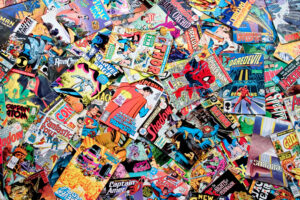Punisher #43 — Writer: Garth Ennis; Penciller: Lan Medina; Inker: Bill Reinhold
Ennis owns the Punisher; the character plays to his strengths, and just about everything he’s done with him (the last two arcs, the Barracuda one and the Afghanistan one, for example) has been dependably nasty, noirish fun. This new story begins as the wives of some of the mob guys/thugs that Castle has killed get together to plot revenge, promising some ironic echoes involving families destroyed by violence. There’s an off-putting line of dialogue from one of the female characters, who’s black, that made me wince — it’s not realistic that the character would say it to the people she’s talking to, and it sure reads as racist, especially if taken out of context — but I think it’s mostly because Ennis’ British Isles background sometimes makes it hard for him to write realistic American ethnic speech patterns. Ennis is good enough, though, that I trust him to work through false notes like this, and eventually make the character work within the story.
Wolverine: Origins #10 — Writer: Daniel Way; Artist: Steve Dillon
I bought this, but hesitated — I’m not quite sure about Way yet. Sometimes I think he’s the next Garth Ennis, especially with his flair for startling, horrific violence (and with the Dillon art connection), but then other times I think he’s the next Frank Tieri (i.e., a competent journeyman, but an imitator, not an innovator). There’s evidence of both here; there are some good character bits, but three significant players end up close to death (all with massive chest wounds) over the last dozen pages, and while the first two have emotional impact, by the third I was just shrugging my shoulders. The climactic father-son encounter in the last scene doesn’t work, either; it’s predictable and almost cringe-inducing. The story’s offered enough good parts so far that I shelled out my money for this last installment — but I don’t know how much longer the book’s going to hold my interest.
52 #36 — Writers: Johns, Morrison, Rucka & Waid; Pencils: Jamal Igle; Inks: Keith Champagne
I wouldn’t have thought I’d still be buying this by now (and, really, looking forward to it more than to Marvel’s Civil War stuff), but it’s been a dependable, intriguing read, and the last few issues have started to accelerate, first with the Luthor/Everyman plot, and now with the Lobo/space-lost story taking center stage. One major character in space dies, apparently for real, although it happens quickly and isn’t particularly heroic (it’s also a character whose powers mean that he could be brought back in a number of different ways, so who knows?). We also finally see Rip Hunter, and enough happens that the last 16 issues promise to be a roller-coaster ride. Anyone not reading this should get the back issues (all of which are still cover price, at least at All About) and catch up to the fun.
Thunderbolts #110 — Writer: Warren Ellis; Artist: Mike Deodato, Jr.
First issue with the new creative team — not that there was anything wrong with the old one, but Ellis brings a different tone to the proceedings — and it’s mostly setup. Norman Osborn’s in charge, and the additions to the cast include Bullseye, Venom (the Scorpion one — Vorpion? Scenom?), Penance and Moonstone. Ellis also brings in the obscure Captain America supporting hero, Jack Flag, as his everyman superhero who’s unregistered, and whom the new TBolts have to hunt down as their first assignment (no one will be surprised if he meets a bad end in the next issue, when things start to actually happen). Ellis is good with corporate bad guys like Osborn, and shows just how he’d be able to threaten and/or manipulate all these hardcore villains into a government-sponsored unit. There’s also some nice media touches, with things like toy commericals acting as propaganda for the pro-registration side. It’s definitely worth picking this one up from the beginning.
Friendly Neighborhood Spider-Man #16 — Writer: Peter David; Penciller: Scott Eaton; Inker: John Dell
Spider-Man was my first favorite character, and I’ll buy most Spidey books, as long as they aren’t inept. This one, happily, is ept: David’s got the characters down pat, and it’s nice to see Betty Brant, Flash, et al acting like they “should,” even now that everyone knows who Peter is (maybe ESPECIALLY now, since David demonstrates that the unmasking thing doesn’t have to be a barrier to storytelling). There’s nothing stunning about this, but it’s good, solid, meat-and-potatoes storytelling, and that’s fine.
Iron Man: Hypervelocity #1 (of 6 ) — Writer/Layouts: Adam Warren; Artist: Brian Denham
Two great things about this mini-series so far: first, it’s by Adam Warren, whose techno-savvy and ability to write sinewy, twisty plots makes him a great match for Iron Man. Second, the words “civil” and “war” never appear in the issue, at least together. Consider it a nice break from whatever the hell they’re doing to Tony over in the “real-time” Marvel Universe.
Which reminds me:
Top Six Lame Ways to end Civil War:
(6) The Hatemonger’s pissing everyone off.
(5) Scarlet Witch reboot
(4) Dr. Strange reboot
(3) The Corrupter’s pissing everyone off
(2) Tony’s the Space Phantom
Oh, and the one I think, sadly, has the best chance of actually being true:
(1) Loki’s doing it




In terms of 52 #36, I can echo Phil’s comments somewhat. To be honest though, I’ve been absolutely lost in the twisty, turny HIGHLY interwoven plot that has been developing since Identity Crisis. I thought Infinite Crisis was weak and lame, but I have stuck with this book hoping in the end it “would all make sense”. I think the writing genius is starting to come through (finally).
It started making sense to me after I read the last Wizard issue (#184) which interviewed all four main contributors separately. They first listed a litany of questions they had and then each writer was asked about their answers in a divide-and-conquor type of approach. As I read the preemptive questions I started saying to myself, “Oh, yeah! I remember that happening.” I started to wonder myself how things had resolved because the story jumps around so much, I thought I might have missed something. Then I also found the 52 summary column on the Wizard website (www.wizardworld.com) and started reading that as well. Come to find out I wasn’t really that lost afterall.
Since DC doesn’t provide a summary “capsule” narrative at the beginning of each issue (like Civil War does), it is easy to get confused. That is why I would recommend searching out some summary materials before tackling this story, even if you do decide to purchase all of the back-issues.
“There’s an off-putting line of dialogue from one of the female characters, who’s black, that made me wince — it’s not realistic that the character would say it to the people she’s talking to, and it sure reads as racist, especially if taken out of context — but I think it’s mostly because Ennis’ British Isles background sometimes makes it hard for him to write realistic American ethnic speech patterns.”
You mean when she said “nigga”? What was she supposed to say, “African-American”?
Well, the fuller quote is:
“I tried everythin’. Tried suckin’ his dick, ’cause nothin’ slows a nigga up like a good dick-suck — but he went.”
This is being said by a Tough Harlem Black Chick, talking about how the Punisher killed her husband; she’s talking to other women whose husbands the Punisher’s also killed through the years. It made me wince because it doesn’t sound like a real person; it sounds like Ennis’s idea of how a Tough Harlem Black Chick would talk, and it’s too much of a caricature.
If you were writing some kind of sensationalistic article on “The New Racism in Comics,” say, and you used that quote, just by itself and with no explanation, as an example, it would get you a lot of attention.
So you didn’t balk at her threatening to cut that other woman’s throat with a razor she kept in her mouth, but saying “nigga” in front of her, no way.